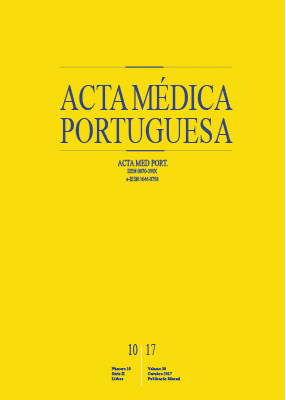Reliability, Stability and Validity of the Brazilian Adaptation of the Oliveira Questionnaire on Low Back Pain in Young People
DOI:
https://doi.org/10.20344/amp.8270Keywords:
Adolescent, Brazil, Low Back Pain, Pain Measurement, Reproducibility of Results, Surveys and Questionnaires, Validation StudiesAbstract
Introduction: The objective of this study was to adapt the Brazilian version, and verify the validity, reliability and internal consistency of the Oliveira questionnaire on low back pain in young people.
Material and Methods: The questionnaire was translated from European Portuguese into Brazilian Portuguese by means of translation and re-translation. The validity of the contents was determined by experts who analyzed the clarity and pertinence of the questions. Fifteen young people aged 15 to 18 took part in the pre-test step (qualitative analysis), 40 in the test-retest (reliability) and 679 in the evaluation of internal consistency. The intra-class correlation coefficient and Spearman’s correlation coefficient were used in the reliability analysis (test-retest), and Cronbach’s alpha to determine the internal consistency (stability).
Results: In the translation phase the questionnaire was modified and considered suitable, observing similarity and equivalence of the two versions. After being corrected by the experts in the validation of the contents, the instrument was considered suitable and valid, and in the pre-test, the young people suggested some modifications to make the questionnaire more succinct. With respect to reliability, the values for the intra-class correlation coefficient were between 0.512 – acceptable and 1 – excellent and Spearman’s correlation coefficient varied between 0.525 and 1, classifying the instrument as reproducible. The internal consistency was considered acceptable with a 0.757 Cronbach’s alpha.
Discussion: The Oliveira questionnaire was choosen since it has been used in several Portuguese studies; moreover, it addresses the need to raise data regarding low back pain and associated risk factors.
Conclusions: The Brazilian version of the Oliveira questionnaire on low back pain in young people showed valid and reliable cultural adaptation, with good reliability and stability.
Downloads
Downloads
Published
How to Cite
Issue
Section
License
All the articles published in the AMP are open access and comply with the requirements of funding agencies or academic institutions. The AMP is governed by the terms of the Creative Commons ‘Attribution – Non-Commercial Use - (CC-BY-NC)’ license, regarding the use by third parties.
It is the author’s responsibility to obtain approval for the reproduction of figures, tables, etc. from other publications.
Upon acceptance of an article for publication, the authors will be asked to complete the ICMJE “Copyright Liability and Copyright Sharing Statement “(http://www.actamedicaportuguesa.com/info/AMP-NormasPublicacao.pdf) and the “Declaration of Potential Conflicts of Interest” (http:// www.icmje.org/conflicts-of-interest). An e-mail will be sent to the corresponding author to acknowledge receipt of the manuscript.
After publication, the authors are authorised to make their articles available in repositories of their institutions of origin, as long as they always mention where they were published and according to the Creative Commons license.









